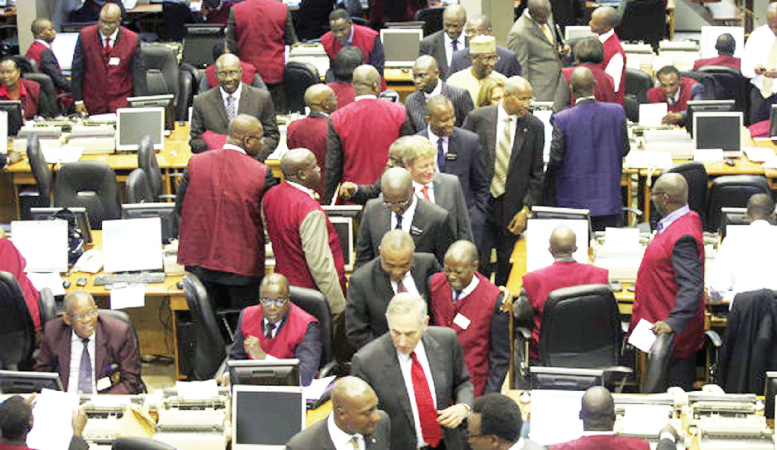- Equities Market Ends Six-day Losing Streak
The Nigerian equities market recorded gains at the close of trading on the floor of the Nigerian Stock Exchange on Thursday, ending six straight days of losses.
The NSE market capitalisation rose to N9.026tn from N9.01tn, while the All-Share Index appreciated to 26,221.75 basis points from 26,173.69 basis points.
A total of 137.638 million shares valued at N990.638m exchanged hands in 3,283 deals.
The equities market closed positive, advancing by 0.18 per cent to settle the year-to-date return at -8.45 per cent.
The volume and value of transactions, however, declined by 5.80 per cent and 4.32 per cent each in comparison to Wednesday’s trading. Sixteen stocks appreciated in value while 20 pared at the end of Thursday’s trading activities.
The highest gaining counters for the day included: Airline Services and Logistics Plc, Guaranty Trust Bank Plc, Vitafoam Nigeria Plc, Fidson Healthcare Plc and Zenith Bank Plc, which appreciated by 4.69 per cent, 4.65 per cent, 4.6 per cent and 4.17 per cent, respectively.
On the other hand, Cadbury Nigeria Plc, Forte Oil Plc, Total Nigeria Plc, Nigerian Aviation Handling Company Plc and Caverton Offshore Support Group Plc lost the most by 9.65 per cent, 8.5 per cent, 8.19 per cent, 4.94 per cent and 4.55 per cent, respectively.
Market performance, as measured by the NSE indices showed that all sectors declined save for the banking index, which advanced by 3.08 per cent; while oil and gas stocks dropped by 3.71 per cent; food and beverages sector depreciated by 0.47 per cent; insurance sector dipped by 0.24 per cent, while the industrial sector fell by 0.003 per cent.
Commenting on the performance of the market, analysts at Meristem Securities Limited, in the firm’s daily analysis, said, “As expected, the market witnessed pockets of bargain-hunting activities on certain large-cap tickers, which in our opinion, led to the marginal gain recorded at the close of trade on Thursday.
“While we do not expect a replica of the current market mood on Friday, it is probable given the current low levels of some fundamentally justified stocks. We however envisage a negative week-on-week return.
Meanwhile, the interbank call rate advanced 350bps to 22.67 per cent amid slightly tighter liquidity. At the foreign exchange interbank market, the naira appreciated N1.40 against the dollar to close at N306.36 at the spot market while the one year forward remained unchanged at N355.
Bearish trading persisted in the Treasury bills market on Thursday amid sell pressure on the short-term bills. Specifically, yield on the 35 day-to-maturity and 105DTM bills advanced to 14.19 per cent and 18.45 per cent, respectively.
Similarly, the bearish streak persisted in the bond space with yields on benchmark bonds rising four basis points on the average. The largest swings were observed on the short-term bonds as yields on the seven per cent FGN October 2019 and 15.54 per cent FGN February 2020 bonds rose seven basis points and nine basis points to 15.03 per cent and 15.27 per cent, respectively.
Commenting on this trend, Vetiva Capital Management’s analysts said, “With bearish sentiment persisting in Thursday’s session, we anticipate a tepid close to the week as tight liquidity constrains buying.”


 Billionaire Watch3 weeks ago
Billionaire Watch3 weeks ago
 Startups4 weeks ago
Startups4 weeks ago
 News4 weeks ago
News4 weeks ago
 News4 weeks ago
News4 weeks ago
 Bitcoin4 weeks ago
Bitcoin4 weeks ago
 Naira4 weeks ago
Naira4 weeks ago
 Forex3 weeks ago
Forex3 weeks ago
 Treasury Bills4 weeks ago
Treasury Bills4 weeks ago
























